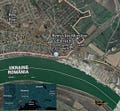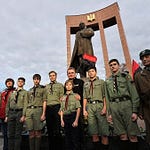Topics:
Welcome back to Political Misfits on Radio Sputnik, where we bring you news, politics and culture - without the red and blue treatment. I am John Kiriakou here with Michelle Witte.
We’re joined by international affairs and security analyst Mark Sleboda.
https://www.washingtonpost.com/world/2023/07/24/russia-ukraine-war-news/
Let’s talk about Russia and Ukraine, and I guess specifically Crimea, Moscow, and Odessa. Russia says Ukraine attacked an ammunition depot in Crimea and attacked residential areas in Moscow with drones. And Russia launched strikes on Ukraine’s port infrastructure in the city of Odessa and further south along the Danube. We also saw, unsurprisingly, conflicting claims about the success so far of Ukraine’s effort to push back Russian gains. Vladimir Putin says the effort has failed - Antony Blinken says it is Russia that’s already lost and that Ukraine has taken back half of the land it lost earlier this year.
I want to get into the fallout from the expiration of this Black Sea Grain Deal in a sec, but first, talk to us about these drones in Moscow - Russia says both were brought down. What were these drones aiming to do?
OK - it appears Russia is targeting Ukrainian port facilities, or at least that’s what we are seeing in the English press. Is this about destroying Ukraine’s agricultural economy?
Vladimir Putin also recently said the Western crying over the Black Sea grain deal is disingenuous, because about 80% of that grain went to upper or upper middle income countries. The UN says, ok, yes, but having that grain on the market helps keep food prices down - and both of these things can be true. What do you predict is going to happen as a result of this deal ending?
What does the end of the deal mean for Ukraine’s economy and for Western support for the country? It’s military aid that gets most of the attention, but Kiev’s Western supporters are also pouring money into Ukraine’s economy to keep it running. If its agricultural sector is wrecked, how much more is going to be needed to keep Ukraine afloat, and is that going to be forthcoming?
I also want to ask about this attack that damaged the Orthodox Transfiguration Cathedral in Odessa, a more than 200-year-old, UNESCO World Heritage site. Russia and Ukraine are blaming each other for the attack, with most Western outlets accepting that the damage was Russia’s responsibility. Sometimes it feels silly to get worked up over an old building being damaged when people are losing their lives, but people are worked up about this. Is it worth noting that this was a cathedral aligned with the Moscow Patriarchate? What evidence does either side have to support their case?
The Wall Street Journal over the weekend ran an analysis of Ukraine’s spring counteroffensive, saying “When Ukraine launched its big counteroffensive this spring, Western military officials knew Kyiv didn’t have all the training or weapons—from shells to warplanes—that it needed to dislodge Russian forces. But they hoped Ukrainian courage and resourcefulness would carry the day. They haven’t.” It references minefields, fortifications and Russian air power as obstacles Ukraine has not been able to overcome, and says “the campaign risks descending into a stalemate with the potential to burn through lives and equipment without a major shift in momentum.” I have to ask you about this. Since the NATO summit earlier this month, there’s been a lot of conversation about Ukraine’s insufficient gratitude and Ukraine’s sarcasm - but it feels like Ukraine’s backers are treating this like the movie Rudy or something. I think Ukraine is perhaps entitled to some sarcasm, when they’re being encouraged to win with just their wits and their heart, I guess. I understand that the West does not want to risk crossing some red line of involvement that would draw them into direct conflict with Russia, but it also feels like maybe there’s a trick unfolding here. Do you think Ukraine’s Western backers ever thought Kiev could win? And if not, why pour so many resources into a doomed fight?
And speaking of resources, a bunch of assurances about F16s have come out of the Aspen Security Forum. The Biden administration has promised Ukraine will have them by the end of the year - Jake Sullivan said yesterday the training process would be a matter of weeks, not a matter of months. What will that mean to this war?
Russian President Vladimir Putin accused Western partners of the Black Sea grain deal of failing to address global food insecurity. In an article posted by the Kremlin, the Russian leader said high- and middle-income countries benefited from exports shipped under the deal instead of African nations. Data published by the United Nations shows that 44 percent of exports under the deal went to countries classified as high-income by the World Bank, and 37 percent went to upper-middle-income countries. The remaining 20 percent went to lower-middle and low-income countries. The U.N., which helped broker the grain deal, has argued that it allows more grain to enter the global market, lowering food prices around the world.





















Dueling Drone & Missile Strikes, Grain Deal Ends in Fire & Fury on Ukraine's Ports, US Officials Admit Kiev Forces Lacked Strength to Carry Out Offensive and more...